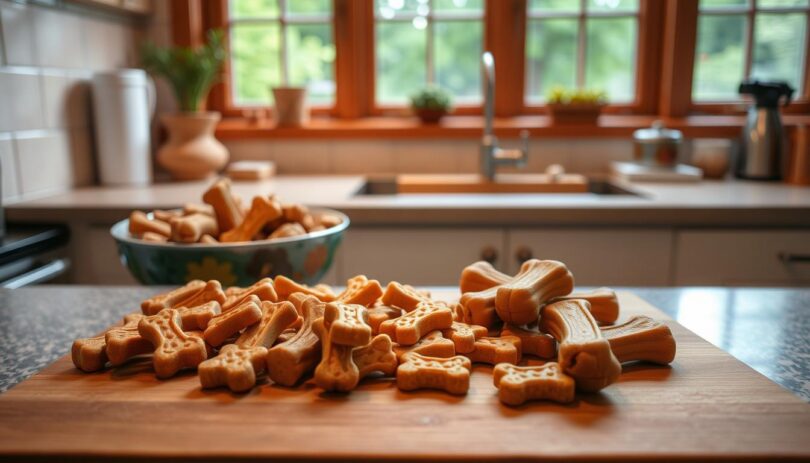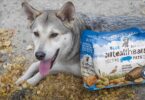Picture this: Your furry companion stares up at you with those irresistible puppy-dog eyes as you crunch on a handful of Cheez-Its. It’s tempting to share, but pet owners often wonder—is this harmless or harmful? Let’s cut through the confusion with science-backed insights.
Cheez-Its might satisfy human cravings, but they’re far from ideal for pets. These cheesy crackers pack excessive sodium and artificial additives, ingredients that offer zero nutritional value for canine companions. Research from Bailey’s CBD and Cheez-It® SmartLabel data confirms they’re better left in the pantry when sharing treats.
Why take chances? Even small quantities could lead to stomach upset or long-term health issues. Responsible pet parents prioritize balanced diets over momentary indulgences. This article explores the risks of processed snacks, breaks down ingredient red flags, and suggests healthier alternatives.
You’ll discover practical advice backed by veterinary expertise, ensuring every treat supports your pal’s well-being. Let’s turn snack time into safe, tail-wagging moments together.
Understanding Dog Nutrition and Dietary Needs
Feeding your pet right is more than just filling their bowl—it’s about science. A balanced diet fuels energy, supports organ function, and strengthens immunity. Proteins rebuild muscles, carbohydrates provide quick fuel, and healthy fats maintain skin and coat quality. Vitamins and minerals act as tiny guardians, preventing deficiencies that could compromise long-term health.
Building Blocks of Canine Health
Veterinarians emphasize that 90% of a dog’s nutritional needs come from species-appropriate meals. Commercial pet foods are formulated with precise ratios of nutrients like omega fatty acids and digestible fibers. Human snacks, however, often lack this balance. Salt-heavy items strain kidneys, while sugary additives disrupt metabolism.
Hidden Dangers in Shared Snacks
One handful of chips contains more sodium than many pets should consume daily. Over time, unsuitable ingredients like onion powder or artificial flavors may trigger dehydration or chronic digestive issues. Obesity risks rise when treats replace nutrient-dense meals. Always consult a veterinarian before introducing new foods—they’ll tailor advice to your companion’s age, breed, and activity level.
Smart snack choices protect your furry friend’s well-being. Stick to vet-approved options designed for their biology, and watch those tail wags multiply.
Exploring the Ingredients in Cheez-Its
What exactly goes into these crunchy squares loved by humans? Breaking down the components reveals why they’re better suited for people than pets. Let’s examine what’s inside and how each element affects nutritional value.
Key Components and Their Nutritional Profiles
Enriched wheat flour forms the base, providing structure but minimal nutrients. Vegetable oil blends add crispness, while processed cheese—made with skim milk—delivers tangy flavor. Terms like “made skim” indicate reduced fat content, though this doesn’t enhance suitability for animals.
Paprika and salt boost taste but contribute no health benefits. Preservatives extend shelf life, and extra oil ensures the crackers stay crunchy. Together, these ingredients create a snack high in sodium and empty calories.
Potential Allergens and Harmful Additives
Skim milk and wheat flour are common allergens for sensitive pets. Processed cheese often contains additives that may upset stomachs. Even small amounts of salt can strain kidneys over time.
While humans enjoy the savory crunch, the ingredient mix lacks proteins or vitamins pets need. Prioritizing species-specific treats avoids unnecessary risks linked to artificial flavors or preservatives.
Can dogs have cheez its: Safety and Health Concerns
Many pet owners don't realize how quickly a seemingly harmless cracker can disrupt their companion's system. Even small quantities of human snacks may trigger adverse reactions in animals with sensitive digestion.
Immediate Digestive Reactions
Stomach upset often appears within hours of consumption. Symptoms like vomiting or diarrhea indicate the body's rejection of unsuitable ingredients. High sodium levels in these snacks force pets to drink excessive water, risking dehydration.
Fatty oils used in processing make digestion harder. Combined with empty calories, this creates metabolic stress. Smaller breeds face higher risk due to their lower tolerance thresholds.
Short-Term Toxicity and Allergic Responses
Some product varieties contain garlic—a known toxin that damages red blood cells in animals. Artificial flavors and preservatives may spark allergic reactions, including itching or breathing difficulties.
One snack delivers concentrated fats and salt without nutritional benefits. Repeated exposure could escalate minor issues into chronic conditions. Always contact a veterinarian if unusual symptoms emerge after accidental ingestion.
Long-Term Health Implications of Feeding Cheez-Its
What happens when occasional treats become regular habits? Processed snacks like these crackers may seem harmless in small doses, but consistent consumption creates ripple effects. Over months or years, unsuitable ingredients disrupt metabolic balance and organ function.
Risks of Obesity and Chronic Diseases
Repeated exposure to high-calorie snacks increases the risk of weight gain. Just 10 extra calories daily could lead to a 1-pound gain annually for smaller breeds. Obesity strains joints, reduces mobility, and elevates the likelihood of heart disease.
Excessive sodium and fats also shorten life expectancy. Studies show pets consuming human snacks regularly face a 20% higher risk of developing diabetes. Chronic inflammation from poor nutrition accelerates organ damage, diminishing quality of life.
Minor dietary slips can snowball into serious health issues. For example, fatty deposits from empty calories may clog arteries over time. Choosing species-specific meals prevents these gradual declines, ensuring pets maintain energy and vitality.
Prevention starts with informed choices. Prioritizing balanced nutrition over fleeting indulgences safeguards long-term well-being. Your companion’s active, joyful life depends on the care you take today.
Healthy Snack Alternatives and Homemade Dog Treats
Switching to healthier options doesn’t mean sacrificing flavor for your furry friend. Nutrient-rich alternatives satisfy cravings while supporting overall wellness. Focus on snacks designed for canine biology—low in sodium, free from artificial additives, and packed with digestible proteins.
Dog-Friendly Commercial Treats
High-quality brands offer treats tailored to specific needs. Freeze-dried chicken chunks provide lean protein without fillers. Dental chews with natural enzymes promote oral health while rewarding good behavior. Look for products meeting AAFCO standards to ensure balanced nutrition.
DIY Treat Recipes for a Balanced Diet
Homemade options let you control ingredients. Try baked chicken bites: cube boneless breasts, bake at 375°F until crispy, and cool before serving. For pups preferring sweets, blend peanut butter, mashed banana, and oats into bite-sized pancakes cooked on low heat.
These alternatives avoid empty calories found in human snacks. Lean proteins like chicken support muscle health, while whole-food ingredients reduce allergy risks. Pair treats with safe snack options approved by veterinarians for worry-free sharing.
Simple swaps create lasting benefits. Your companion gets tasty rewards without compromising their vitality—every crunch becomes a step toward better health.
Practical Strategies to Prevent Dogs from Ingesting Unhealthy Foods
Keeping pets safe starts with smart habits and simple adjustments. Proactive pet parents can create environments where their furry companions thrive without exposure to risky snacks. Let’s explore actionable methods to reinforce good behavior and minimize temptations.
Effective Training Techniques
Teaching commands like “leave it” builds impulse control. Start by offering low-value items, rewarding your dog with high-value treats when they obey. Consistent practice helps pets understand boundaries around human food.
Positive reinforcement strengthens trust between you and your four-legged friend. Involve a veterinarian to tailor training strategies for breeds with strong food drives. Short daily sessions yield better results than occasional drills.
Safe Storage Practices for Household Snacks
Store tempting items in airtight containers placed on high shelves or locked cabinets. Avoid leaving snack bags on countertops—curious noses can easily reach them. Consider childproof latches for lower drawers if your companion is persistent.
Designate pet-free zones during meal prep to reduce accidental spills. Regularly check floors for dropped crumbs that might attract your furry friend. Simple routines like these turn your kitchen into a safer space for everyone.
Final Insights on Protecting Your Dog’s Well-Being
Choosing the right snacks safeguards your pet’s vitality and prevents avoidable health complications. Processed crackers like Cheez-Its contain excessive salt, empty calories, and artificial additives that strain organs over time. Regular consumption risks obesity, kidney stress, and nutrient deficiencies.
Opt for commercial treats formulated with digestible proteins and whole-food ingredients. Homemade options using wheat flour or cheese alternatives offer controlled nutrition without harmful additives like soybean oil or paprika. Always prioritize low-sodium recipes approved by your veterinarian.
Store human snacks securely and train your companion to avoid counter surfing. Small daily choices—like swapping fatty treats for carrot sticks—build lifelong wellness. Partner with a trusted vet to tailor diets supporting energy levels and immune function.
Your furry friend’s health thrives on intentional care. By selecting species-appropriate foods and resisting those pleading eyes, you create a foundation for joyful years together. Every mindful decision becomes an act of love.
FAQ
Are Cheez-Its toxic to dogs?
While not inherently toxic, these crackers contain ingredients like garlic powder and paprika, which may irritate a dog’s digestive system. High sodium levels and processed fats also pose health risks over time.
Can wheat flour in Cheez-Its harm dogs?
Wheat flour isn’t toxic but may trigger allergies in sensitive pets. Symptoms like itching or gastrointestinal upset could occur, especially if crackers are consumed regularly.
What healthier snacks replace Cheez-Its for dogs?
Opt for vet-approved treats like freeze-dried chicken, carrots, or green beans. Commercial brands like Blue Buffalo or Zuke’s Mini Naturals offer low-calorie options with minimal additives.










Leave a Comment